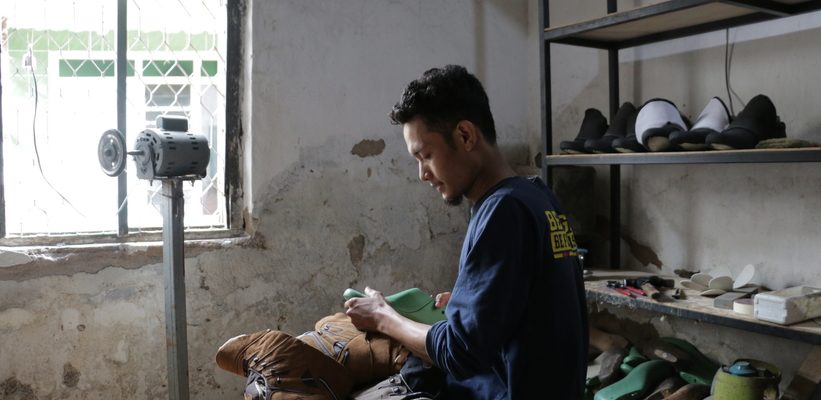Saat ini fenomena inovasi pelayanan publik menjadi perhatian penting dalam upaya reformasi birokrasi. Kebutuhan reformasi…

Digitalization For More Advanced SMEs

SMEs have an important role in the Indonesian economy. The economic growth required by Indonesia to become a middle-income country in 2025 is 7%. The consolidation of the digital economy sector will play an important role for Indonesia to reach its full potential. With the increasing number of small and medium-sized industries (SMIs) involved in the digital economy through broadband (broadband), electronic business (e-commerce), social media, cloud technology (cloud), and mobile phone platforms (mobile platforms), SMEs can grow faster in terms of income and employment, as well as become more innovative and more competitive to face the ASEAN Economic Community (AEC).
It is stated in the research of the world bank that broadband has a very big role in supporting the digital involvement of SMEs. Doubling broadband penetration rates and increasing digital engagement of SMIs could increase Indonesia's annual economic growth by 2%. Basically, digital SMI involvement can be identified into four based on technology adoption, online presence, use of social media, and e-commerce empowerment. SMEs that have online access engage in social media, and develop e-commerce capabilities. Usually enjoy significant business advantages in terms of income, employment opportunities, innovation, and competitiveness. Some of the benefits of using digital technology for SMIs in Indonesia include an increase in income of up to 80%, one and a half times more likely to increase employment opportunities, 17 times more likely to be innovative, and SMEs that use digital technology more to become more competitive internationally.
Since exchanging data and information between different devices and parties in real-time is a key element of smart factories, Such data can represent production status, energy consumption behavior, material movement, customer orders and feedback, supplier data, etc. Therefore, the next generation of smart factories must be able to adapt in real-time to a constantly changing market in terms of demand, technology choices, and regulations.
Technology helps businesses improve communication, operate more efficiently, overcome barriers to accessing training and financial services, and reach more customers. Currently, digitization for IKM in Indonesia is still focused on the use of digital technology in the retail sector and customer interaction. But this is the first step in developing industry 4.0 in Indonesia.
Of course, the next step for SMIs will be the introduction of digital technologies such as cloud computing and data analysis that can improve supply chain management and internal communication efficiency. The platform provides a more affordable way for businesses to access value-added technology, including sales and related party management, including coordinating workers, or human resource management (HR) systems. In the future, by using cloud technology, SMEs can make decisions faster by unifying business reports and displaying information in real-time. Added value and opportunities for growth include:
1. Business Expectation
Digital technology for SMIs will increase access to new customers and increase sales and access to foreign markets. The benefits of digitalization include: access to new customers in Indonesia, increase in sales and revenue, access to new markets abroad, allowing for easier transactions with customers and suppliers, as well as easier advertising.
2. Higher income increase
This is driven by the development of feature products or smart products/smart services. Manufacturing creativity to create smart products or services is also driven by consumers who increasingly require full services for the products provided.
3. Greater job opportunities
According to a delloid survey, offline businesses have a 20% chance of increasing the number of employed workers. Basic online businesses are at least 9% likely to increase employment, while medium and advanced online businesses are 23% and 150% more likely to increase employment than offline businesses.
4. Innovation and export
Businesses with advanced online capabilities are 17 times more likely to be innovative (i.e. experienced a major change in the way they did business in the past year) than offline businesses. Businesses with basic and medium connectivity are about 7 and 12 times more innovative.
Implementation
Technology adoption among SMEs is currently quite a lot. According to a delloit survey, 96% of SMEs in Indonesia have access to computers, 84% have smartphones, and 73% access the internet via fixed or mobile broadband connections. In its implementation, the digitization of SMEs can be carried out in selling products through websites, social media and e-commerce. One of the easiest ways to use digitization is through the web, social media and e-commerce. The involvement of SMEs in digitization can be applied through:
1. Basic online business
A basic online business is a business that has broadband access and digital tools such as computers and smartphones and has a website. However this business is not involved in social media (except email) and has no e-commerce capabilities for ordering or payment.
2. Medium online business
Medium-sized online businesses have digital connectivity and are also actively involved in social media by integrating their sites with social media, live chat, or consumer reviews. This business does not yet have full e-commerce capabilities.
3. Advanced online business
Advanced online businesses have connectivity, social network integration, and e-commerce capabilities.
However, it needs to be considered in implementing the digitization of IKM in Indonesia. IKM in remote areas tends not to have digital involvement because internet access cannot reach remote areas. In implementing IKM digitization and towards industry 4.0, the government's role in providing infrastructure, digital sector regulation, and investment restrictions can play a big role in expanding and accelerating growth. Government policies that need to be considered include:
1. Improved dashboard access
Improved broadband access and service quality will encourage the adoption of digital technology by SMEs and improve performance and existing technologies.
2. Helping all SMEs to become digital businesses
Government support is in the form of programs for SMEs, including programs aimed at increasing the digital involvement of SMEs. A strong partnership with the private sector will help the small number of SMEs in Indonesia.
3. Expanding electronic payments (e-payments)
Government support for electronic payments ensures that payment systems are easily accessible, reliable, and secure. This will build greater consumer trust and increase the use of electronic payments.
4. Expanding access to investment
Digital SMEs require a combination of good investment sources from domestic and international, and barriers to investment access will reduce the potential for SMEs to develop. Investment policies should be open to all sources and types of capital so that SMIs in Indonesia will benefit from wider access to online micropayment instruments.
5. Expanding government services electronically (e-government)
The existence of online government services can build consumer confidence in terms of online activities and services in the future.
The strategy in implementing the 4.0 industrial revolution for SMEs in Indonesia with government policies in the form of providing incentives to labor-intensive business actors in providing and improving industrial infrastructure, preparing industrial human resources through vocational education that leads to high skill engineers, upgrading industrial human resources. This will impact the national economy, namely the expansion of industrial sector segmentation with disruptive manufacturing and an increase in the contribution of the industrial sector to GDP.
With the government's support to increase the number of SMEs that go online, engage with social media, and participate in e-commerce, more SMEs will increase digitalization usage, both from offline to online businesses and from medium to medium to advanced businesses. That way, there will be an increase in the business performance of SMEs in Indonesia which will have an impact on the economy. Key Performance Indicators of the economy in Indonesia as a middle-income country in 2025 have been achieved. Then with the pioneering of digitization in SMEs it will encourage the development of industry 4.0 in Indonesia.
Alfiyan Darojat – BPIPI




This Post Has 0 Comments